Breaking the laws and disregarding state-issued religious activity permits, the CCP represses churches, with the ultimate goal to eliminate Christianity in China.
by Xin Lu
The congregations of legal, certified religious venues that were destroyed or shut down by the CCP very rarely think of defending their rights, understanding well that their protests will end up in more persecutions and retaliation by the state. In cases when the religious attempt to use the law to protect their rights, they soon discover that it is fruitless, and the regime uses the law instead to suppress them.
Church vandalized and looted on Easter Day
The members of a state-approved Three-Self church in the central province of Henan (its name and the exact location is not mentioned to protect the congregation from CCP’s suppression) will remember this year’s Easter for the rest of their lives.
On April 21, when Christians were celebrating the resurrection of Jesus, the director of the church was shocked to find his place of worship in utter disarray. When he entered the church at noon that day, he saw that the cross had been removed and destroyed, the donation box broken, and all the money inside it missing. The door to the church’s storage room had been smashed open, and Bibles, holy garments, posters with religious slogans, and other items had vanished. He noticed a thick pile of ashes next to the church’s entrance – he realized that everything from the storage room had been burnt.

The director was furious. He started asking around and soon learned that officials from the town government and Religious Affairs Bureau vandalized and looted the church.
“The main reason why the government burns Bibles is that they hate God and His words. The government is the devil,” a believer in his sixties said angrily, commenting on the vandalized church.
When the director complained to the Religious Affairs Bureau, its officials claimed that all illegal religious venues are being shut down and prohibited the congregation from holding gatherings in the church. The officials also refused to return the church’s donation money.
Believers were dazed at the government’s explanation – the church was audited and approved by the provincial, city, and county governments in 2003 and was registered as a legal religious venue.
Director suffers retaliation
Hoping to uphold the legitimate rights and interests of the church, the director decided to petition the government. He also made public the photos that he took after the church had been ransacked.
The retaliation from the government was immediate: the church was barricaded off and shut down. Officials also threatened to revoke the director’s preaching qualifications and arrest him if he petitioned the government.
To legalize the shutdown of the church, officials demanded the director to sign a “donation agreement” – a popular means by the government to take over places of worship, pretending that believers themselves had given up their church. The director refused to sign.
A church co-worker who asked to remain anonymous told Bitter Winter that the director was told that he would be sanctioned and treated as a political dissident if he went on to implement his petition plans. The officials also said to him that he was not allowed to reason with the Communist Party’s policies, which are all aimed at preparing to eliminate Christianity – from the central to the local level.
In late June, the director had to present a proof of innocence for a personal matter, so he went to the police to get one. To his surprise, he was told that he has a criminal record because of his attempts to petition the state. The police explained that under the current policy, if somebody is found thinking about petitioning, this matter would be recorded in the person’s file, irrespective of the actual petitioning taking place or not.
Government knowingly breaks the law
A Three-Self church meeting venue in Henan’s Luoyang city was also ransacked by the government – although the church had been approved and had all its documentation in order.

In late March, officials from the county’s Religious Affairs Bureau and township government stormed into the meeting venue, smashed and destroyed the locks on rooms, and searched the place. They seized about 100 Bibles and hymnbooks, dismantled and burned the cross, religious paintings, and other items. Afterward, the government forcibly cut off the church’s electricity supply and ordered the person in charge of the meeting venue to sign a donation agreement, which he refused to do.
One of the church’s co-workers said that the government’s actions are illegal and quoted Article 50 of the new Regulations on Religious Affairs that stipulates: “The lawful assets of religious groups, religious schools or religious activity sites must not be encroached upon, plundered, privately divided, damaged, or illegally sealed up, seized, frozen, confiscated or disposed of by any organization or individual.”
Another church co-worker thinks that the Regulations on Religious Affairs are merely a government tool. When officials want to shut down an unlicensed meeting venue, they bring out the Regulations on Religious Affairs. However, when dealing with a licensed church, not only they don’t protect it under the law, but instead use every available means to occupy and shut it down. “No wonder the common people all say that the Communist Party has no respect for law and order,” the co-worker commented with sadness.












